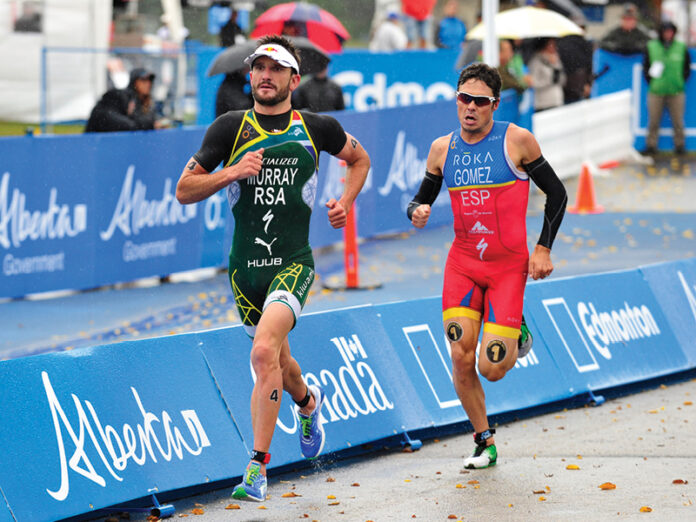
When I started triathlon training, I could barely swim and never rode a bike, but I could outrun most of my peers in track and on the soccer pitch. I was good at suffering in races and took my run preparation seriously, even in elementary school.
To place well in triathlon, all three disciplines need to be developed with a focus on technique and conditioning to improve economy at race effort. This development takes thousands of hours of purposeful training.
In 1985, I did my first triathlon, breaststroking most of the swim. After nine years in the sport, I made the Canadian age-group triathlon team. Five years later I was winning my age group at nationals. Five years after that, I won my first world triathlon title and now, at age 48, I have six world titles, two world silvers and am ranked No.1 in the World in 70.3 distance for my age group.
The bottom line, greatness does not come overnight, but can be reached by most ordinary athletes willing to follow these 10 triathlon triathlon training principles.
-
- Consistency in Training is Critical. Day after day, month after month and year after year — if you want to get faster in triathlon, regular training is necessary. Do the work! To improve, you will rarely have more than two days away from training. Be creative and mix it up. If you find yourself getting sick or injured frequently, that is a sign your training stress is too high or too frequent for your lifestyle Your nutrition might not be adequate.
- You can’t buy greatness. I still race on my 12-year-old triathlon bike. Get good equipment (buy used), take care of it and spend your money on the factors that will promote consistency, progress and good health (nutrition and rest). The limiter in your training progression is health — avoiding small injuries that impair your ability to be consistent. A training program that systematically challenges the body to be structurally resilient is imperative.
- Discover which distance and variation is best for you. Some athletes prefer longer distances, while others do much better in shorter races. You may want to explore off-road triathlon that requires more aerobic power and skill. Sometimes it takes a decade to discover your favourite distance or style. After that, it’s time focus on getting faster.
- Swim a lot. Even though the swim is the smallest percentage of your race (17% in Olympic distance and 10% in long course), it should be the one discipline you train most frequently. Swimming can aid in recovery and overall health, but to race fast, you need to swim 4-6 times per week and accumulate 10-12K per week. I suggest 4 times per week with a mid-week double on one day as you build toward your goal race. Variable training (different strokes, interval durations and intensity) is also important. If all your races are in a wetsuit, train with floatation pants.
- Train on your race bike. About 4-6 weeks out from your first road triathlon, start riding your triathlon or time trial bike (using triathlon bars). Do not make the mistake that you can train on a mountain bike or road bike and smoothly transition to riding fast on your triathlon bike. Ride your triathlon bike at least once a week throughout the year.
- Keep your body mass within 5 per cent of your race weight. Do not let your body morph into a soft hibernating butterball. Stay true to a maximum weight gain and regulate your eating patterns and choices to your training program. Do not justify binge eating because you had an epic training session. Focus on protein and essential oils to minimize inflammation and enhance recovery.
- Surround yourself with great athletes who are willing to include you in training. Learning how to train, what to expect during and after training sessions and how to deal with setbacks is all part of the journey. Great clubs, coaches and teammates will provide the environment of personal greatness.
- Simulate a triathlon or enter a low-key practice race before your season begins to prepare you for the heightened anxiety of competition. Create a transition bag that has all your gear and necessities. You will discover items that are needed or need to be replaced. Don’t let your first important race of the season turn into a practice session because you were unprepared.
- Train hard and listen to your body. Great rid of headphones and electronics! Develop that internal feel for a sustainable effort. Knowing what is too hard comes with experience. To this day, I have never raced with a power meter and rarely race with a heart rate monitor (not even in 70.3 events). When I race XTERRA triathlon, I do not even wear a sport watch. Trust how you feel rather than relying on numbers. Ask yourself if you can go harder relative to the duration and course dynamics. Racing fast comes from the heart, with the added cognitive guidance for fuel and hydration.
- Do workouts that are more uncomfortable than your race. It is OK to explore aggressive levels of pace and eventually tire in training. Bonk once or twice in a training session. Go for it once in a while. Explore your limits. But don’t do this more than once per week in a given discipline. And always rest when your body needs it. Pick your battles, know when to ease up and enjoy being fit!















